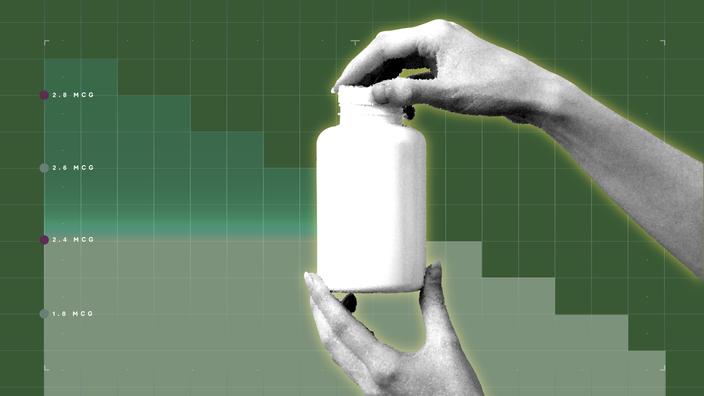
Vitamin B12 Dosage for Adults & Kids: Your GoodRx Guide
Key takeaways:
If your vitamin B12 levels are low, your prescriber may recommend an over-the-counter (OTC) supplement. Most people take between 500 mcg and 1,000 mcg of OTC vitamin B12 per day.
If you’re unable to absorb vitamin B12 from oral supplements, you may need prescription vitamin B12. It comes as an injection or a nasal spray. In most cases, you’ll inject vitamin B12 daily for a week or so. Then, you’ll decrease to one injection per week or per month. The vitamin B12 dosage for cyanocobalamin nasal spray is 500 mcg (one spray) once a week.
Most people get enough vitamin B12 from their daily diet. It’s only helpful to take extra vitamin B12 if your levels are low. Taking more vitamin B12 than you need isn’t likely to cause harm, but there isn’t any benefit to it, either.
Prescription vitamin B12 injections and nasal spray are available as lower-cost generics. GoodRx can help make your prescription more affordable.
Access savings on related medications
Table of contents

Vitamin B12 (cobalamin) is an important nutrient for keeping your cells healthy and working properly. But if your vitamin B12 levels fall too low, you can develop anemia (low red blood cells) and nerve damage. This can make you feel weak, tired, and irritable. It can also cause pins and needles sensations in your hands and feet.
If your vitamin B12 levels are consistently low, your prescriber may recommend a prescription form of vitamin B12 to raise your levels to a normal range. But what’s the right vitamin B12 dosage, and is there a difference between the prescription and over-the-counter (OTC) versions?
How much vitamin B12 do you need per day?
The amount of vitamin B12 you need each day depends on your age as well as other factors. The recommended dietary allowances (RDA) for vitamin B12 are shown in the chart below.
Age | Vitamin B12 RDA |
|---|---|
Birth to 6 months | 0.4 mcg |
7-12 months | 0.5 mcg |
1-3 years | 0.9 mcg |
4-8 years | 1.2 mcg |
9-13 years | 1.8 mcg |
14+ years | 2.4 mcg |
During pregnancy | 2.6 mcg |
While breastfeeding | 2.8 mcg |
Most people get enough vitamin B12 from their diet. But it’s only found in animal products, such as fish, eggs, and dairy. So if you don’t eat animal products, you’re at a higher risk for low vitamin B12 levels. Health conditions or surgeries that affect your stomach or intestines can also raise your risk of low B12. And some medications can interfere with vitamin B12 absorption, too.
Search and compare options
If your B12 levels are only slightly low, or you don’t have symptoms, your healthcare team may have you try an OTC form of oral vitamin B12 first. But if you can’t absorb oral vitamin B12 properly, you’ll likely need prescription vitamin B12 treatment.
What’s the typical OTC vitamin B12 dosage?
The typical OTC vitamin B12 dosage is 500 mcg to 1,000 mcg (1 mg) daily. Your body can’t absorb more than this at a time, so higher doses aren’t recommended.
Keep in mind that OTC vitamin B12 isn’t approved for any health conditions. Studies show that taking vitamin B12 can improve energy levels, nerve pain, and memory problems caused by low B12 levels in the body. But taking extra vitamin B12 isn’t likely to make a difference if your levels aren’t low.
It’s best to see a healthcare professional to check your vitamin B12 levels before taking it. Your prescriber can guide you as to what form and dosage of vitamin B12 is best.
What’s the typical prescription vitamin B12 dosage for adults?
If you’re unable to absorb vitamin B12 from oral supplements, you may need a prescription form of vitamin B12. It comes in two different injections and a nasal spray. The vitamin B12 dosage depends on which form you’re using.
If you have severe symptoms of vitamin B12 deficiency, your prescriber will likely recommend injectable vitamin B12. That’s because injections help raise your vitamin B12 levels faster than other dosage forms.
Good to know: For people who can’t absorb vitamin B12 from their diet or oral tablets, prescription vitamin B12 treatment is usually a lifelong medication.
Vitamin B12 injections
Injectable vitamin B12 comes in two main forms: cyanocobalamin (Dodex) and hydroxocobalamin. They’re equally effective, but cyanocobalamin is more commonly prescribed.
Cyanocobalamin injection
Injectable cyanocobalamin comes in 1 mL, 10 mL, and 30 mL vials that contain 1,000 mcg of vitamin B12 per mL. The FDA-approved injectable cyanocobalamin dosage for adults is 100 mcg (0.1 mL) daily for 6 or 7 days. From there, the dosage can be extended to 100 mcg every other day for 14 days (7 doses), then every 3 to 4 days for several more weeks. Once your vitamin B12 levels have stabilized, it’s recommended to continue with 100 mcg once a month.
But many healthcare professionals follow a different dosing schedule for injectable cyanocobalamin. It’s more common to inject 1,000 mcg (1 mL) once daily for 1 week. Then you’ll inject 1,000 mcg once weekly for 1 month, followed by once-a-month injections thereafter.
You can inject cyanocobalamin under the skin (subcutaneously) or into a muscle. Your prescriber may give you an injection in the office. But they may also teach you how to inject it yourself at home.
Sources of vitamin B12: B12 can be found in everyday animal-based foods — like beef, seafood, poultry, and dairy.
What are the symptoms of low vitamin B12? Here are some key signs that your B12 levels may be low.
Can you overdose on vitamin B12? Find out how much vitamin B12 you really need, and what happens if you take too much.
Hydroxocobalamin injection
Injectable hydroxocobalamin comes in a 30 mL vial that contains 1,000 mcg of vitamin B12 per mL. It must be injected into a muscle.
The recommended hydroxocobalamin dosage for adults starts at 30 mcg (0.03 mL) injected daily for 5 to 10 days. You’ll then inject 100 mcg to 200 mcg (0.1 mL to 0.2 mL) once a month.
Cyanocobalamin nasal spray
Prescription vitamin B12 also comes in a cyanocobalamin nasal spray. It contains 500 mcg of vitamin B12 per spray. The approved dosage for cyanocobalamin nasal spray is 500 mcg (1 spray) in just one nostril once a week. Your prescriber may increase the dose depending on your vitamin B12 levels after 1 month.
Unlike most other nasal sprays, cyanocobalamin nasal spray should not be primed before you use it. Each device only contains one dose of medication, so you’ll waste your dose if you try to prime it first. To use cyanocobalamin nasal spray, follow these steps:
Blow your nose.
Gently close one nostril with a finger.
Insert the device into your other nostril while tilting your head forward.
Close your mouth, breathe in gently through your nose, and press the plunger to administer 1 spray of medication.
Keep your head up and breathe in through your nose and out for your mouth for about 10 to 20 seconds.
Don’t use cyanocobalamin nasal spray within one hour before or after consuming hot foods or liquids. They can make your nose run, which prevents the medication from absorbing properly. If you have nasal congestion or a runny nose, you may need to wait until your symptoms resolve to use Nascobal.
Good to know: Cyanocobalamin nasal spray isn’t approved for severely low vitamin B12 levels. But once your levels have been returned to normal with injectable vitamin B12, Nascobal may be an option for you as an alternative to monthly injections.
What’s the typical prescription vitamin B12 dosage for children?
Only hydroxocobalamin injection has approved dosages for children with vitamin B12 deficiency. But the exact dosage will depend on your child’s age and vitamin B12 levels. In most cases, they’ll inject 100 mcg at a time over the first few weeks until vitamin B12 levels normalize. This typically takes anywhere from 10 to 50 doses. Then, you’ll inject 30 mcg to 50 mcg (0.05 mL) every 4 weeks thereafter.
Other forms of prescription and OTC vitamin B12 are commonly recommended for children. Your pediatrician will give you dosing instructions based on your child’s needs.
What happens if you miss a dose of vitamin B12?
If you miss a daily dose of vitamin B12, take it as soon as you remember. But if it’s close to your next scheduled dose, skip the missed dose and take only the regular dose. Don’t take two doses at the same time.
If you only use vitamin B12 once a week or once a month, and you take your dose a day or two later than usual, you may need to adjust the day of the week or month you take it moving forward. Reach out to your healthcare team for guidance if this happens.
It can be difficult to remember a medication if you don’t take it every day. So you may want to consider a medication reminder app or something similar to help you.
What should you do if you take too much vitamin B12?
Vitamin B12 is a very safe medication. Your body gets rid of any extra vitamin B12 you take through your urine. So too much vitamin B12 isn’t likely to cause you any harm. In rare cases, injectable vitamin B12 can cause skin irritation or rosacea, but these aren’t common side effects.
Keep in mind that taking more vitamin B12 than you should won’t give any added benefit, either. So it’s best to stick to your prescribed dosage, and ask your healthcare team if you have any questions or concerns about how much you’re taking.
How to save on prescription vitamin B12
There are ways to save on vitamin B12 medications. All forms of prescription vitamin B12 are available as lower-cost generics. GoodRx can help you save over 80% off the average retail price of cyanocobalamin nasal spray.
For vitamin B12 injections, the price of injectable cyanocobalamin at certain pharmacies is as low as $15.25 with a free GoodRx discount. And one vial of hydroxocobalamin costs as little as $20.29 with a free GoodRx discount.
Frequently asked questions
There isn’t a set time to take vitamin B12. You should take oral vitamin B12 on an empty stomach because food can interfere with its absorption. In most cases, you’ll inject vitamin B12 weekly or monthly or use the nasal spray once a week. So it’s a good idea to choose a consistent day or time to help you remember your dose.
There’s no evidence that vitamin B12 will help with weight loss. Some studies show that low vitamin B12 levels often go hand in hand with a larger body weight. It’s possible that taking vitamin B12 to correct low levels may increase your energy. This could help you be more active, which can help support weight-loss goals. But this hasn’t been proven, and there doesn’t seem to be any benefit of vitamin B12 if your levels aren’t low.
The bottom line
Most people get enough vitamin B12 from their daily diet. Others may need an over-the-counter supplement to boost their levels. But some people can’t absorb vitamin B12 from their diet or oral supplements. They require prescription vitamin B12 treatment. And most people who need prescription vitamin B12 require it for their lifetime.
The typical OTC vitamin B12 dosage is 500 mcg to 1,000 mcg daily. Keep in mind that it’s only helpful to take vitamin B12 if your levels are low. Taking extra vitamin B12 isn’t likely to cause harm, but there isn’t any benefit to it either.
Vitamin B12 is prescribed as an injection or nasal spray. In most cases, you’ll start with daily vitamin B12 injections for a week or so. After that, you’ll decrease to once-weekly or once-monthly injections. The starting dosage of cyanocobalamin (vitamin B12) nasal spray is 500 mcg (1 spray) in one nostril once weekly.
Why trust our experts?



References
A-S Medication Solutions. (2020). Hydroxocobalamin-hydroxocobalamin injection, solution [package insert].
Al Amin, A. S. M., et al. (2023). Vitamin B12. StatPearls.
Baltaci, D., et al. (2013). Association of vitamin B12 with obesity, overweight, insulin resistance and metabolic syndrome, and body fat composition; Primary care-based study. Medicinski Glasnik.
Carmel, R. (2008). How I treat cobalamin (vitamin B12) deficiency. Blood.
Lupin Pharmaceuticals, Inc. (2023). Cyanocobalamin-cyanocobalamin spray, metered [package insert].
Office of Dietary Supplements. (2024). Vitamin B12: Fact sheet for health professionals. National Institutes of Health.
Sagent Pharmaceuticals. (2023). Cyanocobalamin-cyanocobalamin injection, solution [package insert].
Sun, Y., et al. (2019). Inverse association between serum vitamin B12 concentration and obesity among adults in the United States. Frontiers in Endocrinology.
Was this page helpful?
Related Articles
Browse medications
View AllResearch prescriptions and over-the-counter medications from A to Z, compare drug prices, and start saving.


















